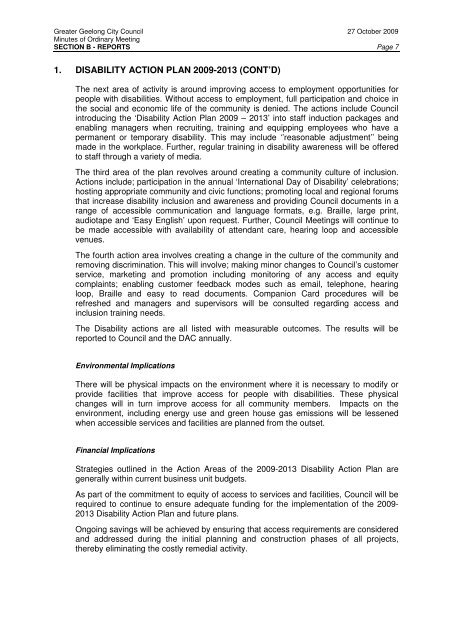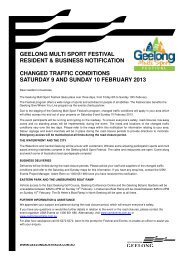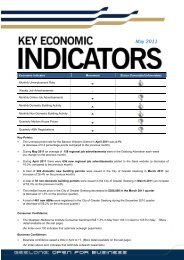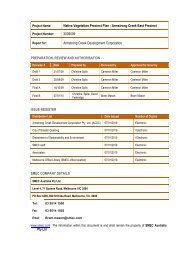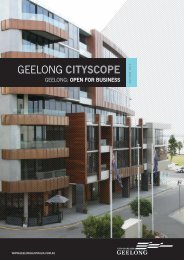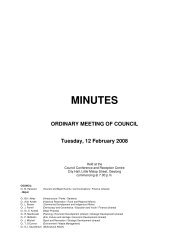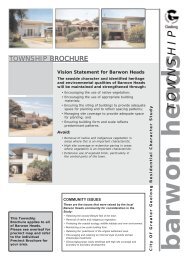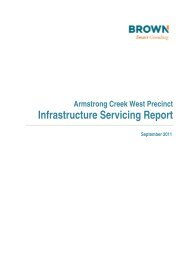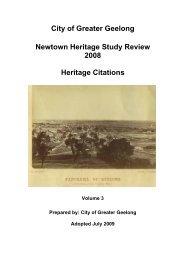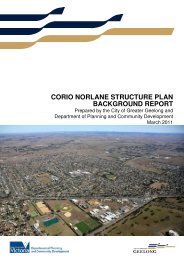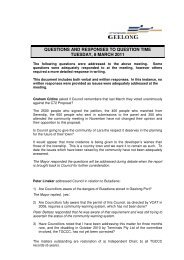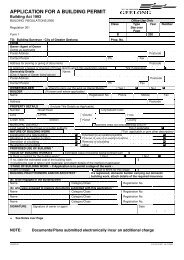Council Minutes - 27 October 2009 - City of Greater Geelong
Council Minutes - 27 October 2009 - City of Greater Geelong
Council Minutes - 27 October 2009 - City of Greater Geelong
Create successful ePaper yourself
Turn your PDF publications into a flip-book with our unique Google optimized e-Paper software.
<strong>Greater</strong> <strong>Geelong</strong> <strong>City</strong> <strong>Council</strong> <strong>27</strong> <strong>October</strong> <strong>2009</strong><br />
<strong>Minutes</strong> <strong>of</strong> Ordinary Meeting<br />
SECTION B - REPORTS Page 7<br />
1. DISABILITY ACTION PLAN <strong>2009</strong>-2013 (CONT’D)<br />
The next area <strong>of</strong> activity is around improving access to employment opportunities for<br />
people with disabilities. Without access to employment, full participation and choice in<br />
the social and economic life <strong>of</strong> the community is denied. The actions include <strong>Council</strong><br />
introducing the ‘Disability Action Plan <strong>2009</strong> – 2013’ into staff induction packages and<br />
enabling managers when recruiting, training and equipping employees who have a<br />
permanent or temporary disability. This may include ‘’reasonable adjustment’’ being<br />
made in the workplace. Further, regular training in disability awareness will be <strong>of</strong>fered<br />
to staff through a variety <strong>of</strong> media.<br />
The third area <strong>of</strong> the plan revolves around creating a community culture <strong>of</strong> inclusion.<br />
Actions include; participation in the annual ‘International Day <strong>of</strong> Disability’ celebrations;<br />
hosting appropriate community and civic functions; promoting local and regional forums<br />
that increase disability inclusion and awareness and providing <strong>Council</strong> documents in a<br />
range <strong>of</strong> accessible communication and language formats, e.g. Braille, large print,<br />
audiotape and ‘Easy English’ upon request. Further, <strong>Council</strong> Meetings will continue to<br />
be made accessible with availability <strong>of</strong> attendant care, hearing loop and accessible<br />
venues.<br />
The fourth action area involves creating a change in the culture <strong>of</strong> the community and<br />
removing discrimination. This will involve; making minor changes to <strong>Council</strong>’s customer<br />
service, marketing and promotion including monitoring <strong>of</strong> any access and equity<br />
complaints; enabling customer feedback modes such as email, telephone, hearing<br />
loop, Braille and easy to read documents. Companion Card procedures will be<br />
refreshed and managers and supervisors will be consulted regarding access and<br />
inclusion training needs.<br />
The Disability actions are all listed with measurable outcomes. The results will be<br />
reported to <strong>Council</strong> and the DAC annually.<br />
Environmental Implications<br />
There will be physical impacts on the environment where it is necessary to modify or<br />
provide facilities that improve access for people with disabilities. These physical<br />
changes will in turn improve access for all community members. Impacts on the<br />
environment, including energy use and green house gas emissions will be lessened<br />
when accessible services and facilities are planned from the outset.<br />
Financial Implications<br />
Strategies outlined in the Action Areas <strong>of</strong> the <strong>2009</strong>-2013 Disability Action Plan are<br />
generally within current business unit budgets.<br />
As part <strong>of</strong> the commitment to equity <strong>of</strong> access to services and facilities, <strong>Council</strong> will be<br />
required to continue to ensure adequate funding for the implementation <strong>of</strong> the <strong>2009</strong>-<br />
2013 Disability Action Plan and future plans.<br />
Ongoing savings will be achieved by ensuring that access requirements are considered<br />
and addressed during the initial planning and construction phases <strong>of</strong> all projects,<br />
thereby eliminating the costly remedial activity.


